Richard E. Grant Interviews Victoria Wood
Excerpt Of The Theater Programme From Victoria Wood’s Stand-Up Comedy Show At The Royal Albert Hall – 20th September to 6th October 2001
Victoria Wood – At It Again
Richard E. Grant Interviews Victoria Wood.
REG: Who’s your audience?
VW: It’s totally mixed, from about ten to seventy, every sort of person, there’s not more women than men, it’s half and half. I think the women are more vociferous but it’s a total mix.
REG: I’m intrigued by your comic ‘sensibility’ which is so obviously informed by the War……
VW: If you’re brought up in the 50’s you do have a reference back to, say, twenty years before then. And because my parents were quite old before I was born, a lot of the family chat was to do with that. I’m the last child of four, and from my brother to me there is a thirteen year span, it’s quite a big gap. So, my references do go back that far, because my father fought in the war.
REG: So are your ‘growing up’ years still very ‘present’ in your……
VW: Consciousness?
REG: Yes. And does everything after that seem to have sped by?
VW: Yeah, it doesn’t affect you to the same degree. I think you’re experiencing things so deeply that it all seems to matter so much that nothing was ever so painful or difficult as the years that had gone before. Childhood things and teenage things are very, very strongly in your consciousness.
REG: Your character’s names – Kitty, Joan and Doris – It’s almost as if you’ve by-passed the 60’s and 70’s back to the 50’s.
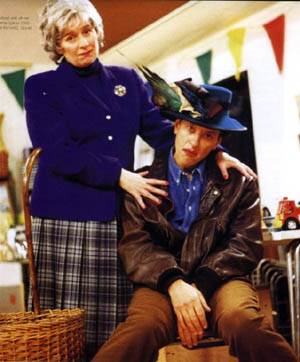
VW: Yes, they’re names of middle-aged women from my childhood. I’m very particular about that. If I’ve got a person of a certain age, she’ll always have the name that she would have, depending on which generation she’s come from – if I was writing a play now and I had middle aged people, they wouldn’t be called Kitty and Doris, you know, they would be called Pauline, Susan and Christine – you have to be careful, you have to be truthful. The stand-up I’m doing in this show is about what’s happening now.
REG: So they’re all called Kylie?
VW: They’re all called Kylie, yes and Shane.
REG: I’m not trying to pigeonhole you by saying yours is a 50’s sensibility, it’s just that in “As Seen on TV”, fifteen years ago, how old were you then?
VW: I was in my early thirties.
REG: So many of the characters were middle-aged women?
VW: Yes, either girls or middle aged. I would never have played somebody of thirty, ‘cos I didn’t know what somebody of thirty was, I didn’t know who I was, really, so you choose a character and you play it from the outside, with a funny hat and a funny voice, because that’s what sketches are. Sketches aren’t really anything particularly deep, they’re just a situation.
REG: I disagree with you.
VW: Well, they can be, but I wasn’t aiming to try and do that.
REG: How do you feel when they enter the vernacular or the national consciousness and somebody quotes you a line, that must happen to you all the time?
VW: Yes, it does.
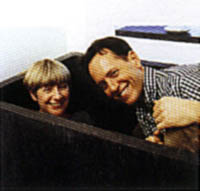
REG: So it is ‘deep’ in the sense that it obviously touches something that is common in everybody’s experience?
VW: Yeah.
REG: I was just thinking of all those 80’s comics – your comedy never struck me as angry, ranting state-of-the-nation polemics, it always seems about loofahs, Swarfega, and tampons?
VW: It was just life really – I didn’t have a very good grasp of politics. It’s not that I don’t think – don’t have deep feelings – but the way I choose to express them. I love those words, I love Swarfega and things like that, and I love –
REG: Spam?
VW: Spam. I love the names. I know I have a particular language.
REG: You’re saying it’s not political, but it obviously is.
VW: Well, it is. It is on some very, very deep level.
REG: Because anybody who is pretentious or poncey or –
VW: Or cruel – I’m on the side of the little people, that’s who I consider myself to be, one of the little people.
REG: OK, so what is your view of the new cruelty, that we have somebody like Anne Robinson who insults and humiliates people for small prize money and has become a multi-millionairess in two squeaks of a second, from doing so?
VW: Yes, there is a culture of cruelty, and it seems to me that people have now forgotten, at the moment – I’m sure it will swing back – they seem to have forgotten there are other ways to make a comic effect other than just abuse somebody. And I think it has a very blunting effect. I find it quite dispiriting really, because I never think that much craft has gone into it. And I think what’s lovely about comedy is that you can really shape it and fiddle about with it until it’s just a much more gorgeous piece of comedy.
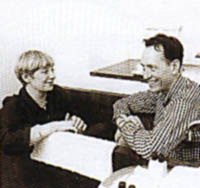
REG: Steve Martin told me that one of the things he found exhausting about comedy is that you spend years building up your act and the moment you put it on TV, you’ve got to keep producing stuff. So the time for the thing to properly develop is short-changed.
VW: There’s a limit to how much live stuff you can do. I mean, if I’d been born in 1900, I could have had a twelve minute act, and done it for the whole of my life, and it would have been absolutely fantastic. I wouldn’t be worn out, I could be playing golf all day or something, because you’d just turn up at the theatre and people would die laughing, then you’d go home again. So I’ve put myself in a situation where once every three or four years, I’ll do a massive great chunk of work and go out on the road with it, but it still has a limited shelf life, ‘cos I find I can’t do the same show, even if I didn’t put it on television or video. I couldn’t physically perform it more than a set number of times, it just does on you.
REG: And do people write asking – why can’t you do this bit again? Or can you bring that character back?
VW: Yes, sometimes. But sometimes I will do the same character again but with different material. I like to give people something new.
REG: So it’s the opposite of a singer who is expected to yodel their greatest hits and the audience goes dead whenever they try new material until they get back to singing –
VW: “My Way”.
REG: Exactly! – then everybody’s happy. So it’s the –
VW: It’s the reverse, it has to be new. But it’s hard, this might be the last time I do a new show and a new tour.
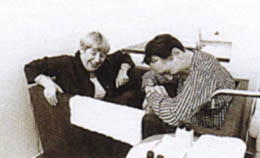
REG: Have you told them that?
VW: I’m telling you now.
REG: You’re not going to be like Frank Sinatra, who had more comebacks –
VW: I mean, I’m not announcing it as a farewell tour, I just think I slightly feel you can go off the boil as a comedian and you don’t even know, and that’s what worries me – I don’t want to end up as some sort of fossilized Bob Hope.
REG: But you’re the only comedian who has ever sold out the Albert Hall for fifteen consecutive nights!
VW: Well it was there or Hammersmith. Hammersmith was very good but you can’t park, you can park at the Albert Hall.
REG: But I’m assuming that you still get a big thrill out of doing it?
VW: I get enough thrill that I want to do it one more time, but I think I’ll get more thrilled by thinking that I won’t do it anymore, and that it might be the last time.
REG: And then what?
VW: Well, I want to move into films and writing longer things.
REG: Like “Pat and Margaret”?
VW: Yeah.
REG: In the survey of the hundred funniest TV characters ever, Mrs Overall being one of them – now that she has been laid to rest, does this mean –
VW: Or has she? Or has she?
REG: Might she resurrect?
VW: Well, now “Crossroads” is back you see, I think its open season on “Acorn Antiques”, really.
REG: This is the news we’ve all been waiting for in the shires!
VW: They’ve always been slightly in tandem. I have to admit.
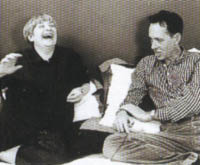
REG: When I first met you, you were adamant that “Acorn Antiques” would be no more.
VW: I’ve changed my mind, as the years have gone by. I think if I ever did another – if I did another Christmas show like we did last year then I think there would be a good case for the new “Acorn Antiques”, like the new “Crossroads”. That’s one of the high spots of my career, inventing “Acorn Antiques”. I’m very proud of it.
REG: Give us the most detailed provenance of “Acorn Antiques”.
VW: Well, when I was writing “As Seen on TV”, I wanted something that would go from week to week, and at that time, I had no social life, I never went out, I was very into bad daytime television and I decided I wanted to have a soap opera, and I wanted it to look like “Crossroads” and I wanted it to sound like “Waggoner’s Walk” which was on the radio at the time, which was full of ‘Honestly, Tim, absolutely off-limits.’ you know, there were big climaxes at the end. There was a terrible daytime drama called “The Cedar Tree”, which was all set in one room, and they were describing what had gone on in another room, ‘cos they only had one set. And it had some sort of loveable old cleaner in it, or something. “Take the High Road” had a woman called Mrs Mac and sometimes she would come on as her own sister, which always used to make me roar laughing because it was the same actress in everything, and it had very funny music. It used to be just a shop – people would come in and buy tins of beans. Nothing ever happened, whenever you turned it on, even after a lapse of a year, it would be the same shop and the same people buying the same beans. So I called it “Acorn Antiques” ‘cos I’d just been working for some people called Acorn Pictures. It was really good fun to do because the cameramen could be quite creative, sort of crashing into things, and then we were all doing our own little thing, and the set was moving. And I did music on a little tiny keyboard, which I recorded myself, like the twangy music on “Crossroads”, and we put the lines on a real blind, and sort of did it with our hands. Everybody could have a go.
REG: The north-south divide in “Pat and Margaret” is obviously central to what you write about, yet you live in London?
VW: I have an Aga.
REG: She has an Aga?!
VW: You heard it here. Once somebody wrote and said ‘I would really hate to go to Victoria Wood’s house and learn that she had an Aga and a Smallbone kitchen’, and I had both those things ‘cos I’d just bought a house with those things in it!
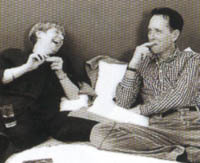
REG: And did you feel like you’d sold out?
VW: No, I’d just bought a house and it happened to have an Aga and a Smallbone kitchen! It’s full of posh people where I live and a very great source of entertainment to me all the time. And also the place I came from. I don’t want to be a professional Northerner – I live where most of my work is so that I’m not leaving my children all the time. It’s quite a pragmatic decision.
REG: What are you nostalgic about?
VW: I’m not nostalgic for my childhood, really, at all. Because I didn’t really enjoy it that much. It was quite boring, and I was quite miserable a lot of the time. I’m not really nostalgic for the north, particularly. The things I liked are the things that are still there, the landscape and the accent, really. I’ve still got the accent, you know, and I like to go there. But I don’t have this thing that, ooh, everybody’s nice in the north and everybody’s horrible in London. I love the voices, I love the accent, I love the vocabulary. More comics come from Lancashire than anywhere else – there is a way of taking, very deadpan, sort of dismissive. It’s a real puncturing way to talk – they take everybody down a peg. Nobody in the north could ever say, ‘Oh my darling, that was so fantastic,’ you know, they’ll say ‘I didn’t mind it’, or ‘it wasn’t for me’, or very flat, ‘I like it’. It’s not very celebratory, I’m quite – I’m quite a celebratory person myself but I don’t talk in a celebratory way, because I can’t because of where I’m from. And my mother didn’t like anything. All she said was ‘Tch, tch’, that’s a very Lancashire thing, ‘Tch, tch’.
REG: So she never encouraged you?
VW: She didn’t discourage me, that’s another Lancashire double negative, she didn’t discourage me. My father encouraged me because he was a frustrated performer, he was an insurance man and he wished he wasn’t an insurance man. But I don’t think she quite got it. I was brought up in a family where nobody ever talked about anything. Lived in different rooms within a huge bungalow, all partitioned off with plywood, and we all had a little bit each, like battery hens. And nobody mingled. I had a room with a telly and a piano. My father was in another room with a typewriter, typing away. My mother was in this other room full of filing cabinets full of wool, I don’t know why, ‘cos she just collected things. And my other sisters were either out or in their own compartments. Everybody ate at different times. If my father ever came in when I was watching the television, he would only watch it standing up, as if about to leave, and so you’d spend the whole time thinking, is he going? He’d say, ‘No, no, I’m just going,’ and then he’d go. My mother never watched television at all – it went back to the shop in the summer, ‘cos you were supposed to be outside.
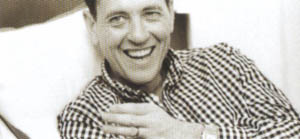
REG: Was that the norm?
VW: No, I’d go into other people’s houses and their house would be tidy, our house was like a complete bombsite. My mother collected things. She once bought a sack of wooden shoe lasts and the entire costumes from “No, No, Nanette”. We had a house full of junk. But also full of books, up and down all the walls, all the partitions were shelved, so we had to walk everywhere sideways and she read obsessively, and so did I.
REG: What kind of books?
VW: She would only read Victorian novels and in the end, she did a thesis for her degree on minor Victorian novels when she went back to university.
REG: Did you know that this was unusual?
VW: I was desperate to live in an avenue or in a semi. We had this big house on top of a hill, but there was nobody around, and because my parents were so strange, we never ever had any visitors. Sometimes I would bring a friend from school, and then my mother would be hovering for a week beforehand, and the house would be completely spotless when they came, then we’d all breathe a sigh of relief once they’d gone.
REG: Would your father sit down if they came to the house?
VW: Oh no, he’d disappear back into – clack, clack, clack with the typewriter again.
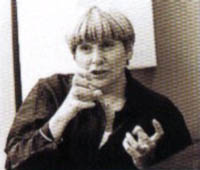
REG: And he had no friends?
VW: Well, he didn’t have any friends that came to the house, and she didn’t either.
REG: This is extraordinary! Have you talked about this before?
VW: No, not much, no. It was a strange way to be brought up. When I was eight, I wanted a birthday party and I gave out all these invitations, but nobody came. Only one boy came. It was like nobody thought it was a real place ‘cos they’d never seen where I lived ‘cos it was so far away. And I remember going with my father, who was driving around to all these people’s houses, saying, ‘Is your child coming to my child’s birthday party?’ And they’re going, ‘No, don’t know anything about it.’ And my mother coming out to greet everybody, and there’s just me and the school swot.
REG: And you had the Twiglets out and everything?
VW: Yes, and the balloons and the cake and just this one boy.
REG: Were you humiliated?
VW: I blanked it, I wouldn’t see that it had any significance. And when I told my husband, he was totally shocked. He said, ‘That’s one of the most awful things. It’s so sad.’ And I was saying, ‘No, it’s alright, what’s wrong with it?’ I can see that it’s sad, but I didn’t feel it as sad at the time.
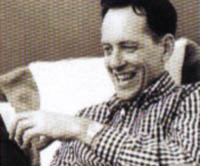
REG: Do you socialize now?
VW: Yeah. But it’s taken me a long time to learn how to do it. I’ve had a long period of being quite reclusive. I recreated my parents’ living conditions without knowing it. So I was either on stage going ‘Ha, ha, ha, ha,’ or I was just at home.
REG: Are you surprised at the longevity of your friendship with Julie Walters, since 1978?
VW: I’m not surprised. And I like to think, that ten years or twenty years down the line we still could be working together. ‘Cos there’s always – there’s always going to be things that I write and I think, ‘Oh, I have to write this for Julie,’ ‘cos she’s just very special to me. And that’s really the exciting part about writing. I love writing for specific people.
REG: Can you actually pinpoint when ‘Victoria Wood’ emerged?
VW: I can pinpoint when I realized how you wrote a joke. And that was unfortunate, because I’d been in comedy for seven years already! The first ever sketch I wrote, when I was at The Bush Theatre in 1978, when I first realized I could actually form a joke on a piece of paper, was just a fantastic day. I wrote a sketch for me and Julie. And just a voice and a way of talking came into my head, and a way of phrasing, and all the things that an outside would say that’s very Victoria Wood, just came out. And it was like when you strike a gong and it’s true. And I thought, that’s it, that’s it then. I pity the poor people who saw me before then!
REG: And you knew it at that time?
VW: I did, I did, really. It used to be like a rocket, this sketch. It was called ‘Sex’ – Julie was a librarian, and I was a woman getting a book out. Alison Fiske, who played a sort of hippyish, middle aged woman, comes in and this girl says, ‘I think I’m pregnant,’ and she says, ‘Where are you in the menstrual cycle?’ And she says, ‘Taurus.’ And that was the first – that was like a proper joke, boom boom, it’s a joke, you know.
Julie was a great inspiration to me, because of how she was and how she acted. I never used to tell Julie how marvelous I thought she was because I thought, well, she must know. But, I thought, how can she know if I never actually say it? So now I always say. We’re all insecure, we all like to be told, and I’m sure people have thought, ‘Oh, Julie’ – everybody knows Julie’s marvelous, but if nobody says it, how does she know it?
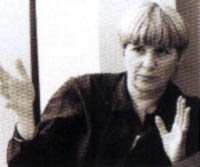
REG: How much of your work is based on people you know? – The waitress in your ‘Two Soups’ classic for example?
VW: Julie and I were in a hotel, and there was a waitress – but it would never be interesting to me to take a real person and try and impersonate them. One thing about them will set off a lovely great spiral and you end up with another person. It’s just a kicking off point really. I’ve also had chips on my shoulder in the past, and that’s a wonderful way to get rid of – you know, if somebody’s really upset you or hurt you, you take something from them and you put it into a ludicrous character, and it makes you feel a lot better.
I once did a chat show and at the end of the evening, a woman came up to me and said, ‘Do you talk like that on purpose?’ I should have said, ‘Do you, you stupid trout?’ But I didn’t. I was so hurt. But we just have it as a joke now. ‘Oh, do you talk like that on purpose?’ I felt for years that people were really very patronizing towards me, so I take pompous people and I just squash them in my work, because I wasn’t able to do that in my twenties when I was being touted around by a manager. He used to say, ‘I’ll talk for Fatty,’ and it gave me great rage, which I haven’t particularly got now.
REG: Would it be fair to define your work as ‘the comedy of the commonplace?’
VW: Yes. Al that concerns me is – do I think I’ve done it as well as I can do it, and are they laughing? That’s all I really care about. If somebody says to me, ‘What is your show about?’ I’ve got no idea. I’m just going to go on and be as funny as I can for two hours, and then I go home, and that’s all I want to do. It’s a wonderful job, because it’s so simple. All it needs is a person and some other people watching, that’s all it is.








